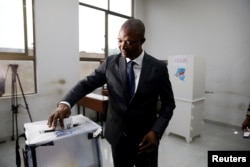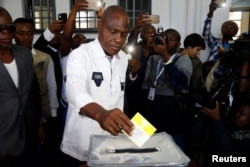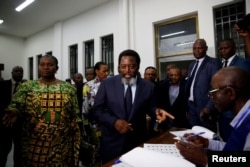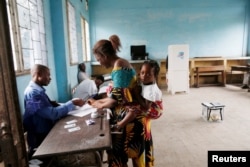Millions of citizens in the Democratic Republic of Congo voted Sunday in a contentious, chaotic national election that has been repeatedly delayed and marred with glitches and allegations of rigging. While voting day, too, was marked by chaos, confusion and anger, millions of people among a voters’ roll of 40 million participated in what may be the most important poll in this nation’s independent history.
This poll marks the nation’s first opportunity at a peaceful transfer of power in almost 60 years as an independent country.
Most Congo-watchers predicted chaos would ensue as the sprawling nation voted in Sunday’s long-delayed general election -- and they were right. Perhaps nowhere was that clearer than in the capital, Kinshasa, where delays at polling stations prompted hundreds of angry voters to greet the head of the electoral commission Sunday morning with chants demanding his resignation. An unknown number of polling stations opened late in Kinshasa on Sunday -- and as the sun set, a number remained open beyond closing time to handle the voters still waiting in line.
It has been, says analyst Stephanie Wolters of the Institute for Security Studies, a worrying scene. Like many avid Congo-watchers, she was not in Congo for this poll. The government has financed the poll itself and has been openly, vocally, hostile to foreign involvement.
“We’ve seen polling stations that opened late, we’ve seen polling stations without electoral material being delivered, we’ve seen problems with the voting machines ranging from there not being voting machines at polling stations to voters not knowing how to use them, we’ve also seen a lot of cases where voters didn’t know where to go because the voters’ lists were posted late, and there’s been bad weather," she said. "So there have been a number of quite significant challenges that we’ve seen so far.”
The two top presidential contenders — ruling party candidate Emmanuel Ramazani Shadary and opposition favorite Martin Fayulu — voted in Kinshasa in the morning.
Fayulu, a former oil executive and political newcomer, is predicted to win, according to a recent political opinion poll conducted by several respected Congolese and international think tanks. However, the groups noted in their report that this result is only expected if the poll is free and fair, which many observers and critics of the regime expect it not to be. Worryingly, the report also noted that the majority of voters say they will not accept the results if the ruling coalition candidate — Shadary — wins.
Also making an appearance at the polls was longtime president Joseph Kabila, whose reluctance to organize polls in when his mandate ended 2016 led to him staying in power two years beyond his term. He smiled and waved to the cameras as he cast his ballot in the upscale Gombe neighborhood, where just two weeks ago, a fire tore through an election depot and destroyed most of the voting machines meant for the capital, prompting officials to announce a one-week delay from the original date of December 23.
Fayulu stopped to speak to the press after voting.
“Change is finally happening and there will be a change, a real change and we will make this country something you will not recognize, because we have all the tools,” he said. “The human means, the natural resources. We have men and women capable of running this country. Like the other nations of the world run their countries, developed nations."
In the volatile east of the country, where the government had delayed the poll until March over an Ebola outbreak and other security concerns, a local politician told VOA that hundreds of residents queued up at the stadium in the town of Beni and voted anyway in a mock poll. The results of that poll were not yet available, though the area is an opposition stronghold.
That act of defiance, Wolters says, underscores the desperate desire for change and improvement in a nation rich with resources but severely lagging in infrastructure and most other developmental indices.
“I think that what we’ve seen is that the Congolese population really wants to use its vote to determine its own future, feels very strongly about that. And so of course, in that sense, going out to vote today is a hopeful act. But I think that a lot of people are also very skeptical, and distrustful of the institutions that have been involved in preparing this vote,” she said.
That hope extends far beyond Congo’s borders. On Sunday, Pope Francis threw in an unscripted plea for the people of Congo during his weekly prayer service at the Vatican. The head of the Catholic Church said he hoped for a “peaceful climate that will allow the elections to be carried out in a regular and peaceful manner.” He then exhorted the crowd to join him in his plea, by reciting the “Hail Mary.”








